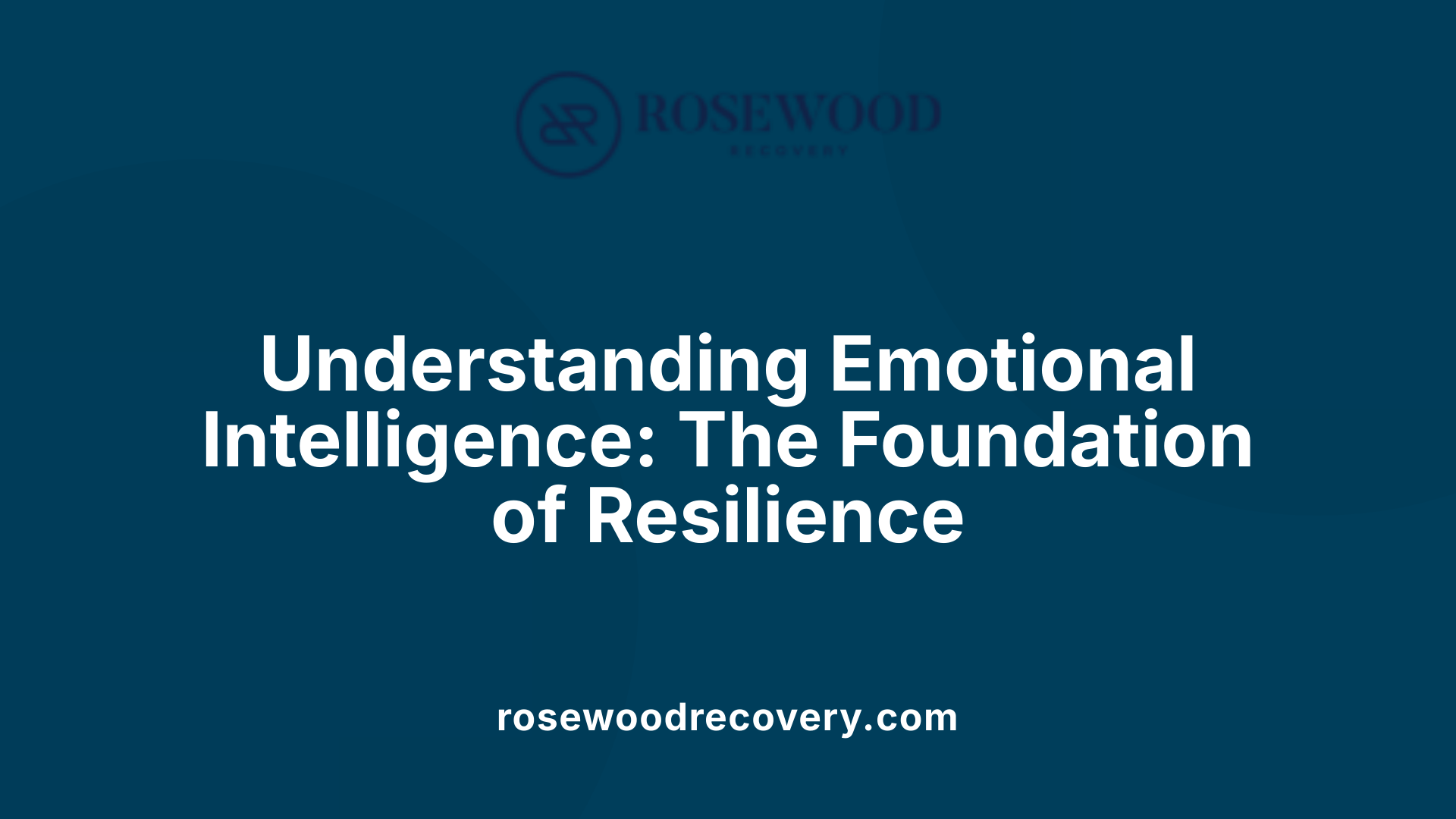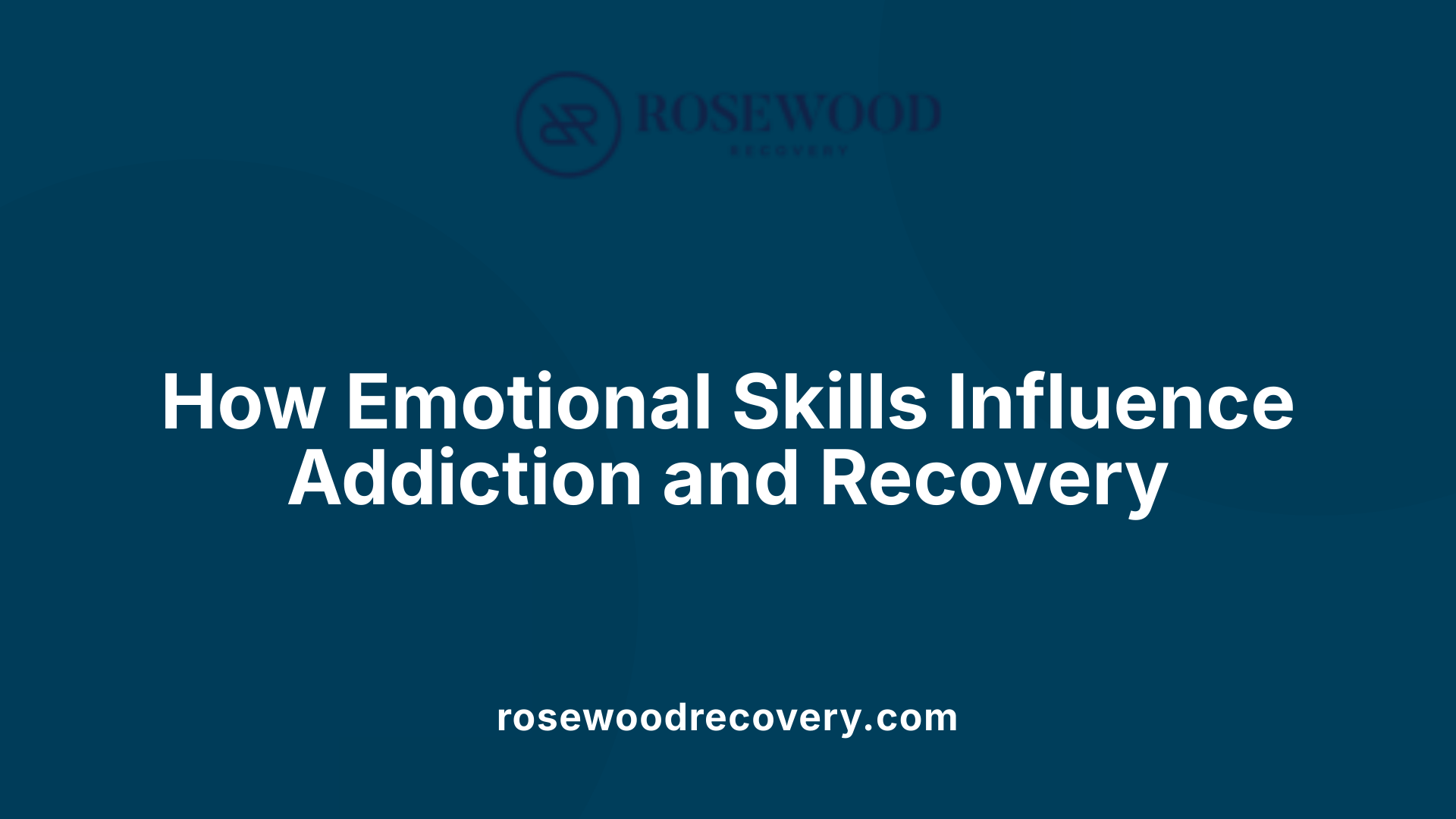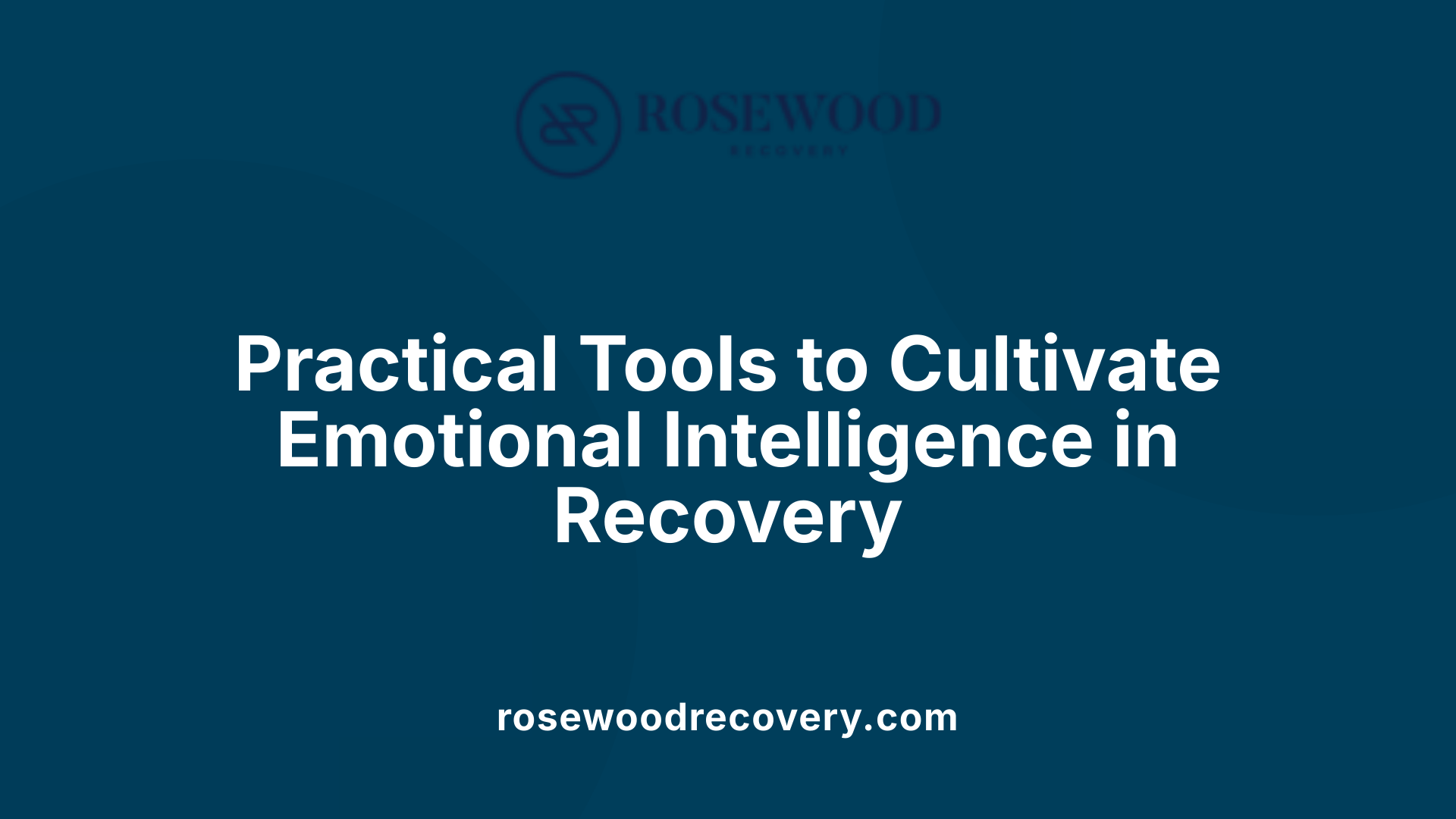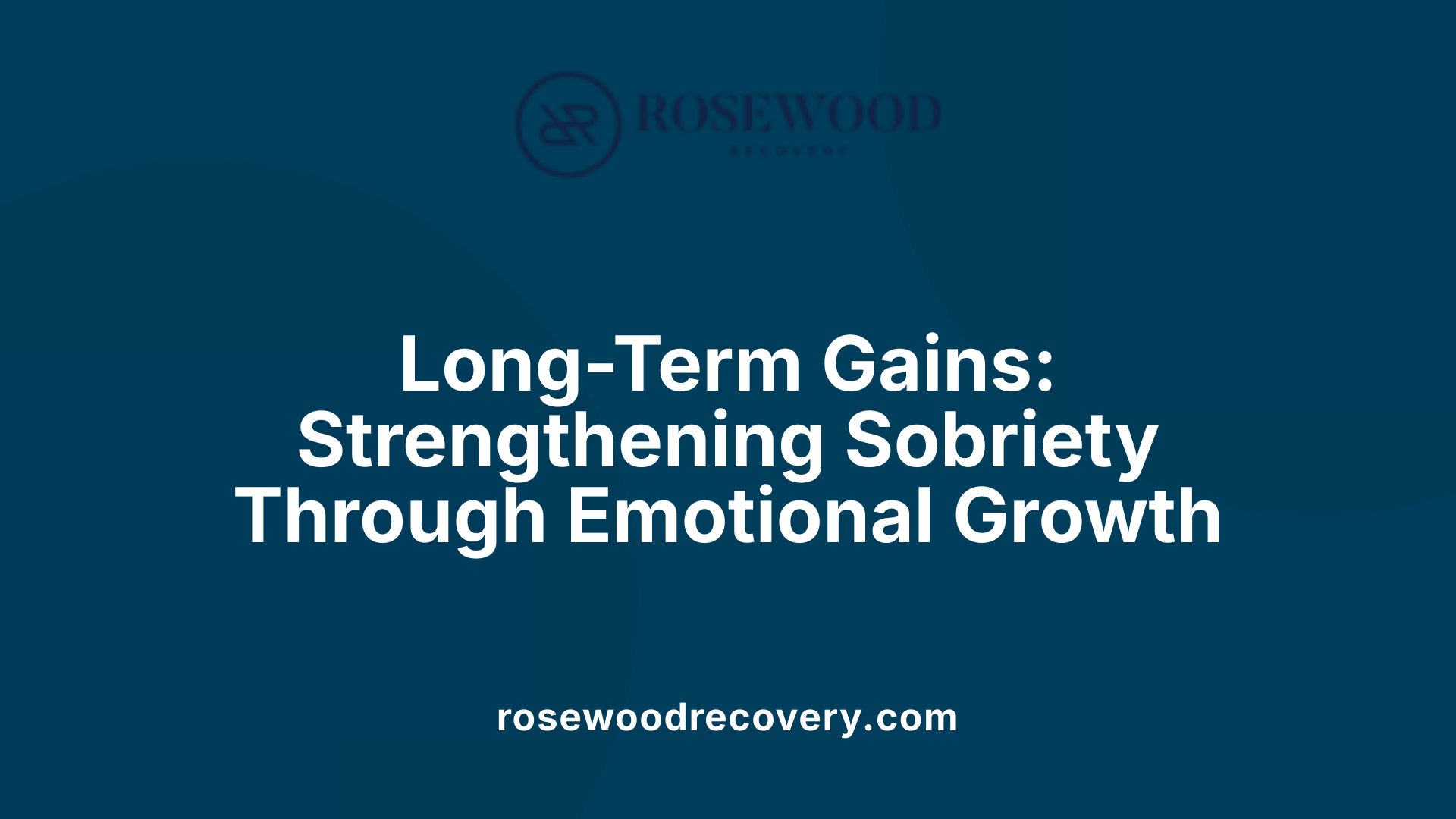Understanding Emotional Intelligence’s Crucial Role in Addiction Recovery
Emotional intelligence (EQ) plays a pivotal role in addiction recovery, serving as both a foundation and a facilitator for overcoming substance dependence. Comprising key skills like empathy, self-awareness, emotional regulation, social skills, and motivation, EQ can be cultivated at any life stage. Its development supports individuals in managing emotions related to addiction and triggers, fostering resilience and long-term sobriety. This article explores how enhancing emotional intelligence influences recovery outcomes, the benefits of developing these skills, and proven strategies to bolster emotional capacity, backed by scientific research.
Defining Emotional Intelligence and Its Components

What is emotional intelligence?
Emotional intelligence (EQ) is the ability to recognize, understand, and manage one's own emotions while also perceiving and influencing the emotions of others. It encompasses skills like emotional awareness, regulation, empathy, and social capabilities that, when developed, significantly affect behavior and relational dynamics.
Developing EQ helps individuals navigate complex social environments, maintain mental health, and establish stronger relationships. It is especially important in addiction recovery, where managing difficult feelings like anger or sadness can be challenging.
What are the key components of emotional intelligence?
The five core components of emotional intelligence are:
| Component | Description | Additional Notes |
|---|---|---|
| Self-awareness | Understanding and recognizing your own emotions | Helps in identifying trigger points and emotional states |
| Self-regulation | Managing and controlling emotional responses | Prevents impulsive reactions that may lead to relapse |
| Motivation | Driving oneself toward goals with persistence | Supports staying committed to recovery goals |
| Empathy | Understanding and sharing the feelings of others | Enhances support networks and relationship quality |
| Social skills | Managing relationships effectively and communicating well | Critical for building healthy relationships and support systems |
Strengthening these areas can promote emotional stability, resilience, and healthier interactions. Therapy sessions, mindfulness practices, and active self-reflection are practical ways to develop these skills, supporting long-term sobriety and overall mental health.
The Link Between Emotional Intelligence and Addiction

How does low emotional intelligence influence addiction?
Low emotional intelligence (EI) can significantly contribute to addiction. When individuals struggle to recognize, understand, and manage their emotions, they often turn to substances as a way to cope. Difficulties in controlling emotions such as anger, sadness, or frustration make it hard to navigate emotional challenges healthily. This emotional fragility can lead to self-medication with drugs or alcohol to soothe overwhelming feelings or to avoid emotional pain.
Research indicates that individuals with lower EI tend to have more impulsive behaviors and less resilience during stressful situations, increasing their vulnerability to substance dependence. Additionally, lower EI correlates with unstable personality traits, which are associated with a higher risk for addiction and relapse.
The role of emotional management in substance dependence
Effective emotional regulation plays a pivotal role in preventing and overcoming addiction. When individuals develop skills like self-awareness, self-regulation, and stress management, they are better equipped to deal with emotional triggers that might otherwise lead to relapse.
Therapeutic approaches such as Cognitive Behavioral Therapy (CBT) and Dialectical Behavioural Therapy (DBT) often focus on enhancing these skills. Mindfulness practices, including meditation and reflection, help individuals respond thoughtfully to emotional cues rather than reacting impulsively.
Developing EI not only curbs the immediate urge to self-medicate but also builds resilience against future triggers. Higher levels of emotional intelligence are associated with lower substance use severity, better treatment engagement, and longer-lasting sobriety.
How does emotional management support sustained recovery?
By improving emotional regulation, recovering individuals can better handle stress, cravings, and emotional upheavals. Techniques like mindfulness, active listening, and relapse prevention tools such as HALT (Hungry, Angry, Lonely, Tired) empower individuals to pause and assess their feelings.
Building EI fosters empathy and stronger social skills, enabling individuals in recovery to seek and maintain healthy relationships, which are vital for long-term sobriety. Ultimately, investing in emotional intelligence development helps create a stable foundation that reduces relapse risks and promotes overall mental health.
| Aspect | Importance | Practical Strategies |
|---|---|---|
| Emotional Recognition | Ability to identify emotions accurately | Journaling feelings, mindfulness practices |
| Self-Regulation | Managing emotions during stress | Breathing exercises, meditation |
| Motivation | Staying committed to recovery | Goal setting, self-affirmations |
| Empathy | Understanding others' emotions | Active listening, perspective-taking |
| Social Skills | Building healthy relationships | Effective communication, boundary setting |
This comprehensive development of emotional skills supports a healthier, more resilient approach to overcoming addiction and sustaining sobriety.
Clinical Approaches to Developing Emotional Intelligence During Recovery

What therapies are effective in enhancing emotional intelligence?
In addiction recovery, a variety of therapeutic approaches are employed to bolster emotional skills. Cognitive Behavioral Therapy (CBT) focuses on identifying and changing negative thought patterns that influence emotions and behaviors. Dialectical Behavior Therapy (DBT) centers on teaching emotion regulation, mindfulness, distress tolerance, and interpersonal effectiveness. Group therapy offers a supportive environment where individuals can practice social skills, share experiences, and develop empathy with others facing similar challenges.
Holistic methods such as meditation and mindfulness are also integral. These practices help individuals become more aware of their emotions, learn to observe their feelings without judgment, and respond thoughtfully, reducing impulsive reactions.
How do these therapies support emotional development?
These treatment modalities provide practical tools for managing emotional states, addressing unresolved trauma, and fostering resilience. CBT and DBT help individuals recognize emotional triggers and develop coping strategies, which are crucial for preventing relapse.
Group therapy enhances social awareness and empathy through shared experiences, strengthening interpersonal skills. Meditation and mindfulness cultivate self-awareness and emotional regulation, enabling individuals to respond better to stressors. Together, these therapies create a comprehensive framework that supports emotional growth, vital for maintaining sobriety.
| Therapy Type | Focus Area | Benefits | Additional Notes |
|---|---|---|---|
| CBT | Thought and behavior change | Increases self-awareness, reduces negative thinking | Effective for addressing cognitive distortions |
| DBT | Emotional regulation and interpersonal skills | Enhances mindfulness, distress tolerance | Particularly useful for emotion-driven behaviors |
| Group therapy | Social skills and support | Builds empathy, reduces isolation | Facilitates peer learning and validation |
| Meditation & Mindfulness | Emotional awareness, stress reduction | Improves self-regulation, reduces impulsivity | Promotes presence and resilience in tough moments |
These therapies collectively help individuals develop vital emotional intelligence skills, such as self-awareness, self-regulation, and empathy, which are essential for long-term recovery.
Practical Strategies to Enhance Emotional Intelligence in Addiction Recovery

What practical strategies can support emotional intelligence development?
Building emotional intelligence (EI) is a vital part of successful recovery from addiction. Various practical strategies help individuals understand and manage their emotions better.
Mindfulness meditation is one effective approach. It trains individuals to stay present and observe their emotional responses without immediate reaction, which enhances self-awareness and emotional regulation.
Behavioral analysis allows individuals to identify patterns in their emotional responses and behaviors, enabling them to modify negative reactions and develop healthier coping mechanisms.
Relapse prevention tools like HALT (Hungry, Angry, Lonely, and Tired) help individuals recognize emotional and physiological states that increase relapse risk. Addressing these triggers proactively supports emotional management.
Active listening skills are also essential. By genuinely paying attention during conversations, individuals improve their empathy and social skills, which bolsters their support networks.
Fostering intrinsic motivation encourages individuals to find personal purpose and goals in their recovery journey. This internal drive sustains effort and resilience through emotional challenges.
How do these strategies contribute to resilience?
These approaches work together to strengthen emotional regulation and self-awareness, allowing individuals to respond more adaptively to stress, cravings, and emotional triggers.
Enhanced interpersonal skills foster better support systems, reducing feelings of isolation and increasing motivation to stay sober.
Overall, developing these skills creates a more resilient mindset, equipping individuals to handle setbacks and environmental triggers more effectively, which is crucial for maintaining long-term sobriety.
| Strategy | Focus Area | Additional Benefits |
|---|---|---|
| Mindfulness meditation | Emotional regulation | Reduces stress, enhances self-awareness |
| Behavioral analysis | Pattern recognition | Facilitates adaptive responses, reduces impulsivity |
| HALT (Hungry, Angry, Lonely, Tired) | Trigger management | Prevents relapse by addressing emotional and physical needs |
| Active listening | Social skills | Improves empathy, strengthens relationships |
| Cultivating motivation | Personal goal setting | Sustains effort, fosters resilience during emotional lows |
Employing these strategies can significantly improve emotional intelligence, contributing to a more resilient and successful recovery process.
Benefits of Cultivating Emotional Intelligence in Recovery

What are the benefits of developing emotional intelligence during addiction recovery?
Building emotional intelligence (EI) provides essential advantages for individuals working to overcome substance dependence. Developing skills such as self-awareness and emotion regulation helps in managing difficult feelings like anger, sadness, or cravings. This emotional control reduces impulsivity and promotes healthier decision-making.
A strong EI foundation also improves relationships with others, fostering better communication and empathy. These improved social skills support the formation of a reliable sober support system, which is crucial during recovery.
Furthermore, therapies like Cognitive Behavioural Therapy (CBT) and Dialectical Behavioural Therapy (DBT) incorporated in rehab programs facilitate the development of emotional intelligence. Holistic approaches, including mindfulness and meditation, enhance resilience and help individuals respond thoughtfully rather than react impulsively.
Overall, cultivating EI enhances a person's ability to cope with emotional triggers that might otherwise lead to relapse, contributing to sustained sobriety and healthier living.
How does EQ influence emotional stability and relapse prevention?
Higher emotional intelligence stabilizes mood and emotional reactions, making it easier to handle intense feelings. When individuals understand and manage their emotions effectively, they are less likely to succumb to impulsive behaviors driven by negative emotions like guilt or anger.
This capacity for emotional regulation helps prevent relapse by allowing individuals to stay centered during stressful situations or environmental triggers. It also supports the development of healthier habits, including mindfulness practices, which promote thoughtful responses.
Research indicates that individuals with higher EI scores tend to have lower levels of alcohol and drug abuse. They also report fewer cravings and less emotional turmoil, which reduces the risk of relapse.
In summary, social and emotional skills learned through EI foster greater resilience and emotional stability, crucial components for maintaining recovery over the long term.
| Aspect | Benefits | Additional Information |
|---|---|---|
| Emotional Regulation | Reduces impulsivity and manages cravings | Supported by therapies like CBT, DBT, mindfulness |
| Resilience | Strengthens ability to rebound from setbacks | Building EI includes reflective practices and support groups |
| Relationship Skills | Fosters healthier connections | Enhances empathy, active listening, boundary setting |
| Relapse Prevention | Decreases risk of returning to substance use | Higher EI linked to better coping with emotional triggers |
Empirical Evidence Supporting Emotional Intelligence’s Impact on Addiction Recovery
What scientific research exists on the role of emotional intelligence in overcoming addiction?
Research indicates a strong link between emotional intelligence (EI) and substance use behaviors. Studies have shown that individuals with substance use disorders generally have lower EI scores compared to healthy individuals. A significant negative correlation exists between EI and personality instability among substance abusers, suggesting that low EI can contribute to impulsive and risky behaviors associated with addiction.
Interventions designed to boost EI, such as emotional regulation training and therapy, have demonstrated positive outcomes. Participants in these programs often experience fewer cravings, reduced relapse rates, and improved emotional stability. For example, in opioid addiction, specific EI programs led to increased emotional skills and notably lower relapse rates—only one individual relapsed in the EI intervention group versus multiple relapses in control groups.
Furthermore, research highlights that enhancing EI skills can help individuals better recognize and manage their emotions, cope with stress, and build supportive relationships—factors critical for successful recovery.
What does science say about EI as a treatment component?
Evidence from scientific studies underlines the importance of including emotional intelligence assessment and development as part of addiction treatment. Higher EI correlates with greater engagement in treatment programs, better management of emotional triggers, and fewer tendencies to seek self-medication through substances.
Treatments that incorporate emotional regulation strategies, mindfulness, and social skills training show promise in improving overall recovery outcomes. These approaches enable individuals to face emotional challenges more effectively, reducing the likelihood of relapse and supporting long-term sobriety.
In summary, scientific research underscores that developing emotional intelligence is an impactful component of addiction recovery, facilitating better emotional management, resilience, and sustained abstinence.
| Research Focus | Findings | Practical Implications |
|---|---|---|
| EI and personality stability | Lower EI linked to personality instability | Addressing EI improves mental resilience |
| EI interventions in opioid addiction | Increased EI scores, reduced relapse | EI training can effectively support recovery |
| Relationship between EI and cravings | Higher EI associated with fewer cravings | Incorporate EI skills into therapy |
| Treatment engagement | Higher EI correlates with active participation | Develop EI as part of comprehensive care |
This collective evidence affirms that fostering emotional intelligence is not only beneficial but essential in effective addiction treatment and relapse prevention.
The Impact of Emotional Skills on Managing Emotions and Triggers
How do emotional skills help manage emotions, triggers, and prevent relapse?
Developing emotional intelligence (EI) equips individuals with essential skills like emotion recognition and regulation, which are crucial in managing difficult feelings and environmental cues. When someone can identify emotions such as anger, sadness, or frustration early, they are better prepared to respond in healthy ways rather than resorting to old habits like substance use.
Practical strategies, including mindfulness and social support, enhance these skills by fostering self-awareness and emotional regulation. Mindfulness, for instance, helps individuals pause and reflect rather than react impulsively to emotional or environmental triggers. This awareness creates space for choosing healthier responses, reducing the chances of relapse.
Therapies like Cognitive Behavioral Therapy (CBT) and Dialectical Behavior Therapy (DBT) directly support building these skills. They teach coping methods, problem solving, and relapse prevention tools such as HALT (Hungry, Angry, Lonely, Tired), which help individuals identify emotional vulnerabilities before they escalate.
Ultimately, strong emotional skills contribute to better impulse control, emotional resilience, and healthier relationships—all essential components in maintaining sobriety.
What is the role of emotional awareness in preventing relapse?
Emotional awareness plays a central role in relapse prevention by enabling individuals to recognize early warning signs of emotional distress. Warning signs might include rapid mood swings, negative thoughts, or physical sensations like clenched fists or a racing heart.
By cultivating a high level of emotional awareness through reflective practices and therapy, individuals can catch these signs early. This early recognition allows them to implement coping strategies—like breathing exercises, grounding techniques, or reaching out for support—that can soothe emotional upheaval.
Being aware of emotional states also empowers individuals to address unresolved traumas or unmet needs before they trigger relapse. The ability to be honest about feelings, set boundaries, and seek help when necessary creates a stronger foundation for sustained recovery.
In sum, emotional awareness acts as a safeguard, helping individuals navigate emotional storms and environmental triggers more effectively, which significantly diminishes relapse risk.
| Aspect | Explanation | Related Strategies |
|---|---|---|
| Emotional recognition | Identifying feelings early | Mindfulness, self-check-ins |
| Emotional regulation | Managing feelings effectively | Deep breathing, CBT, DBT |
| Trigger response | Responding healthily to cues | HALT, support systems |
| Relapse prevention | Using skills to maintain sobriety | Reflection, relaxation techniques |
| Support system | Seeking help when needed | Group therapy, peer support |
Enhancing Emotional Intelligence Through Knowledge and Practice
How can individuals enhance their emotional intelligence?
Building emotional intelligence (EI) is a gradual process that involves developing various skills such as self-awareness, self-regulation, motivation, empathy, and social skills. Practical strategies include engaging in self-awareness exercises that help individuals recognize and understand their own emotions. Reflecting on past influences and their impact on current emotional responses can deepen this understanding.
Setting healthy boundaries is also vital, as it protects one’s emotional well-being and promotes respectful interactions. Sharing one's truth openly and honestly fosters authenticity, which encourages genuine relationships and personal growth.
Additionally, practicing empathy enables individuals to better understand others' feelings, strengthening social connections. Professional help, whether through therapy or group sessions, offers guided support in developing these skills. Techniques like cognitive-behavioral therapy (CBT), dialectical-behavioral therapy (DBT), and mindfulness practices are effective ways to enhance emotional intelligence.
Why is authenticity important in emotional growth?
Authenticity in emotional expression is fundamental for meaningful self-understanding and building trust with others. When individuals are true to their feelings and share their experiences honestly, it promotes deeper personal insight.
Being authentic helps foster genuine relationships, leading to increased support and resilience during recovery. It also encourages a forgiving attitude toward oneself, reducing emotional suppression or avoidance.
In the context of addiction recovery, authenticity enables individuals to confront and process difficult emotions rather than relying on substances to numb or avoid them. This genuine emotional engagement supports long-term sobriety and mental health.
Practical Strategies for Building Emotional Intelligence
Below are some effective approaches to develop and strengthen emotional intelligence:
| Strategy | Description | Additional Notes |
|---|---|---|
| Reflection and Journaling | Regularly reflecting on emotional experiences helps recognize emotional patterns. | Helps identify triggers and emotional responses. |
| Boundaries Setting | Establishing clear boundaries protects emotional health and promotes respectful interactions. | Prevents emotional burnout and manipulation. |
| Authentic Self-Expression | Sharing true feelings promotes honesty and authenticity in relationships. | Builds trust and fosters personal growth. |
| Group Therapy and Support | Participating in group discussions encourages empathy and social skills. | Facilitates shared understanding and support. |
| Meditation and Mindfulness | Practices that enhance present-moment awareness can improve emotional regulation. | Reduces impulsivity and emotional reactivity. |
Additional Insights on Building Emotional Intelligence
| Aspect | Impact on Recovery | Related Concepts |
|---|---|---|
| Self-awareness | Recognizing emotions helps manage them effectively. | Reflection, emotional insight |
| Empathy | Understanding others’ feelings improves social bonds. | Compassion, relational skills |
| Emotional regulation | Managing reactions prevents relapse triggers. | Mindfulness, coping strategies |
| Boundary setting | Protects emotional space and promotes respect. | Authenticity, self-respect |
Developing emotional intelligence is a continuous journey that significantly contributes to resilience, healthier relationships, and sustained recovery. By practicing these skills and maintaining authenticity in emotional expression, individuals can create a more balanced and fulfilling life.
Long-Term Benefits of Developing Emotional Skills for Sobriety and Life
What are the long-term benefits of developing emotional intelligence?
Building emotional intelligence (EQ) during recovery offers rewards that extend well beyond maintaining sobriety. Enhanced EQ not only helps individuals stay committed to their sobriety by managing emotions like anger, sadness, or frustration but also plays a crucial role in improving overall mental and physical health.
When individuals develop skills such as self-awareness, self-regulation, empathy, and motivation, they gain better control over stress and emotional triggers that might otherwise lead to relapse. This emotional regulation fosters resilience, enabling individuals to bounce back from setbacks and remain focused on their recovery journey.
Moreover, high EQ correlates with fewer unhealthy behaviors and dangerous impulsivity, reducing the risk of future substance use. It also helps forge stronger, healthier relationships, which are vital for ongoing support and mental stability.
In terms of physical health, managing stress more effectively reduces the burden on the body, decreasing the risk of stress-related illnesses like hypertension and depression. A balanced emotional state increases overall well-being, encouraging healthier life choices.
How does emotional maturity influence overall well-being?
Emotionally mature individuals are better equipped to handle life's challenges. They approach problems with a calm mindset, practice healthy communication, and set boundaries that protect their mental health.
This maturity fosters a positive outlook and greater happiness, as individuals are more adept at finding constructive solutions rather than dwelling on negativity. Such mental stability enhances physical health through reduced stress levels and improved sleep, diet, and exercise habits.
Furthermore, emotional maturity helps in cultivating empathy and understanding towards others, strengthening social bonds. These stronger relationships provide emotional safety nets, crucial for sustaining long-term recovery and general happiness.
Overall, developing emotional intelligence and maturity creates a solid foundation for a stable, fulfilling life, benefiting one's mental, physical, and social well-being.
| Aspect | Benefits | Additional Insights |
|---|---|---|
| Mental Health | Reduced anxiety, depression, and stress | Enhances resilience and coping skills |
| Physical Health | Lower blood pressure, better sleep, improved immunity | Less stress-related health issues |
| Relationships | Stronger bonds, better communication, healthier boundaries | Facilitates healthier social support systems |
| Life Satisfaction | Increased happiness, stability, and fulfillment | Promotes a balanced, positive life outlook |
| Relapse Prevention | Better emotion management reduces relapse risk | Supports sustained sobriety and recovery |
Emotional intelligence development is a lifelong journey. Its benefits in supporting sobriety, fostering overall well-being, and promoting a healthy, balanced life are well-documented and vital for long-term success.
Fostering Emotional Skills for a Resilient Future
Cultivating emotional intelligence is a transformative process that bolsters individuals’ capacity to manage their emotions, build supportive relationships, and navigate life's challenges with resilience. In addiction recovery, EQ acts as a powerful tool to reduce relapse, improve mental health, and promote sustained sobriety. Through evidence-based therapies, mindfulness practices, and ongoing personal reflection, individuals can strengthen their emotional skills, laying a stable foundation for a healthier, more resilient future beyond addiction. Emphasizing emotional development as a core component of treatment not only enhances recovery success rates but also enriches overall well-being.
References
- Why Is Emotional Intelligence Important in Recovery?
- Why Emotional Intelligence Is Vital for Recovery
- The Correlation between Emotional Intelligence and ...
- Building Emotional Intelligence In Recovery
- Emotional Intelligence and Its Role in Recovery
- Assessing emotional intelligence domains and levels in ...
- PMC Search Update
- Why Is Emotional Intelligence Important in Recovery?
- Why Emotional Intelligence Is Vital for Recovery
- Why Is Emotional Intelligence Important in Recovery?




